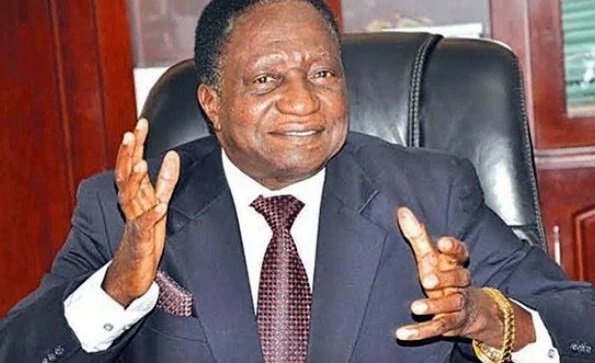CRIME
Trial of ex-JAMB registrar, 4 children stalled

The trial of former Registrar, Joint Admission and Matriculation Board (JAMB), Prof. Dibu Ojerinde, and four of his children was on Monday, stalled at a Federal High Court, Abuja following a plea for an adjournment by the defence.
The matter, which was listed for trial, could not proceed after counsel for the defence, Ibrahim Isiyaku, SAN, sought an adjournment before Justice Inyang Ekwo to enable him make proper arrangement for the defendants’ representation.
It was reported that the Independent Corrupt Practices and other related Offences Commission (ICPC) had, on June 15, arraigned the ex-JAMB registrar on charges of official corruption and abuse of office.
In a charge marked: FHC//ABJ/CR/119/2023, Ojerindebwas arraigned alongside four of his children; Mary Ojerinde, Olumide Ojerinde, Adebayo Ojerinde and Oluwaseun Ojerinde as 8th to 11th defendants.
Also joined in the 17-count charge are six companies linked to him, namely: Doyin Ogbohi Petroleum Limited, Cheng Marbles Limited, Sapati International Schools Limited, Trillium Learning Centre Limited, Standout Institutes Limited and Esli Perfect Security Printers Limited as 2nd to 7th defendants respectively.
The defendants, however, pleaded not guilty to the counts preferred against them, and were granted bail by the court.
When the matter was called, Isiyaku, who announced appearance for 1st, 2nd, 3rd, 7th, 9th, 10th and 11th defendants, acknowledged the matter was slated for trial.
He, however, said that though the matter was brought to his office and there had been appearances before for all the defendants in his absence, he only came into the matter fully the previous day.
“Having studied the file, I realise that we cannot appear for all the defendants but seven of the defendants only in order to avoid conflict of interest.
“I have already discussed with the prosecution that we shall be seeking for adjournment and later arrange counsel for the other four defendants,” he said.
ICPC’s lawyer, Ebenezer Shogunle, did not oppose the application.
But Shogunle stated that he could only conceded for an adjournment for a day since the matter continued the following day as their witnesses were on ground.
Isiyaku, who insisted he would not be around on Tuesday, said he had an election petition matter to attend to.
Justice Ekwo adjourned the matter until Nov. 15 and Nov. 16 for commencement of trial.
The judge, however, warned that the court would not entertain any question as to the admissibility of documents sought to be tendered until towards the end of the trial, in order to accelerate hearing in the matter.
NAN reports that in the 17 charges, ICPC alleged that the former JAMB boss conspired with three of his children (Oluwaseun Ojerinde, Olumide Ojerinde, and Adebayo Ojerinde) to sell off property worth $150,000 after it had been forfeited to the Federal Government by a court order.
The property is located at House No. 4 Ahomko Drive, Achimota Phase 2, Accra, Ghana.
The prosecution also accused Ojerinde of incorporating companies and taking up simultaneous appointments as chairman and director, while being a public officer on full-time appointment as registrar/chief executive of National Examinations Council (NECO), Minna and the Joint Admission and Matriculation Board (JAMB), Bwari, Abuja.
ICPC said this was despite that Ojerinde knew “very well that the Code of Conduct for Public Officers forbids public officers from engaging in private business other than farming or participating in shareholding of joint stock companies.”
The commission also alleged that Ojerinde, “in order to avoid various anti-corruption and anti-money laundering policies of government, notably Know Your Customer (KYC) and Bank Verification Number (BVN) policies, took measures to conceal his ownership and active participation in the management of some of these companies by using forged documents, stolen identities and synthetic names.”
According to ICPC, some of the alleged offences are contrary to and punishable under Sections 17, 19, 22 and 24 of the Corrupt Practices and Other Related Offences Act, 2000.
Some of the offences were also said to be contrary to, and punishable under Section 1 of the Advanced Fee Fraud Act, 2006.




 Davido's Net Worth & Lifestyle
Davido's Net Worth & Lifestyle 
